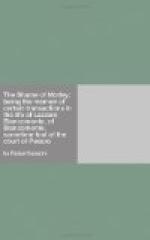How I came to keep my tongue from wagging out the truth I scarcely know. It may be that I was frightened of the punishment that might overtake me did I betray my master; but I rather think that it was the fear of betraying myself, and so being flung into the outer darkness where there was no such radiant presence as Madonna Paola’s. For had I told her it was I had penned those poems that were the marvel of the Court, she must of necessity have guessed my secret, for to such quick wits as hers it must have been plain at once that they were no vapourings of artistry, but the hot expressions of a burning truth. It was in that—in their supreme sincerity—that their chief virtue lay.
Thus weeks wore on. The vintage season came and went; the roses faded in the gardens of the Palazzo Sforza, and the trees put on their autumn garb of gold. October was upon us, and with it came, at last, the fear that long ago should have spurred us into activity. And now that it came it did not come to stimulate, but to palsy. Terror-stricken at the conquering advance of Valentino—which was the name they now gave Cesare Borgia; a name derived from his Duchy of Valentinois—Giovanni Sforza abruptly ceased his revelling, and made a hurried appeal for help to Francesco Gonzaga, Lord of Mantua—his brother-in-law, through the Lord of Pesaro’s first marriage. The Mantuan Marquis sent him a hundred mercenaries under the command of an Albanian named Giacomo. As well might he have sent him a hundred figs wherewith to pelt the army of Valentino!
Disaster swooped down swiftly upon the Lord of Pesaro. His very people, seeing in what case they were, and how unprepared was their tyrant to defend them, wisely resolved that they would run no risks of fire and pillage by aiding to oppose the irresistible force that was being hurled against us.
It was on the second Sunday in October that the storm burst over the Lord Giovanni’s head. He was on the point of leaving the Castle to attend Mass at San Domenico, and in his company were Filippo Sforza of Santafior and Madonna Paola, besides courtiers and attendants, amounting in all to perhaps a score of gallant cavaliers and ladies. The cavalcade was drawn up in the quadrangle, and Giovanni was on the point of mounting, when, of a sudden, a rumbling noise, as of distant thunder, but too continuous for that, arrested him, his foot already in the stirrup.
“What is that?” he asked, an ashen pallor overspreading his effeminate face, as, doubtless, the thought of the enemy came uppermost in his mind.
Men looked at one another with fear in their eyes and some of the ladies raised their voices in querulous beseeching for reassurance. They had their answer even as they asked. The Albanian Giacomo, who was now virtually the provost of the Castle, appeared suddenly at the gates with half a score of men. He raised a warning hand, which compelled the Lord Giovanni to pause; then he rasped out a brisk command to his followers. The winches creaked, and the drawbridge swung up even as with a clank and rattle of chains the portcullis fell.




